Top 10 AI Tools for eCommerce Leaders Use To Develop Businesses
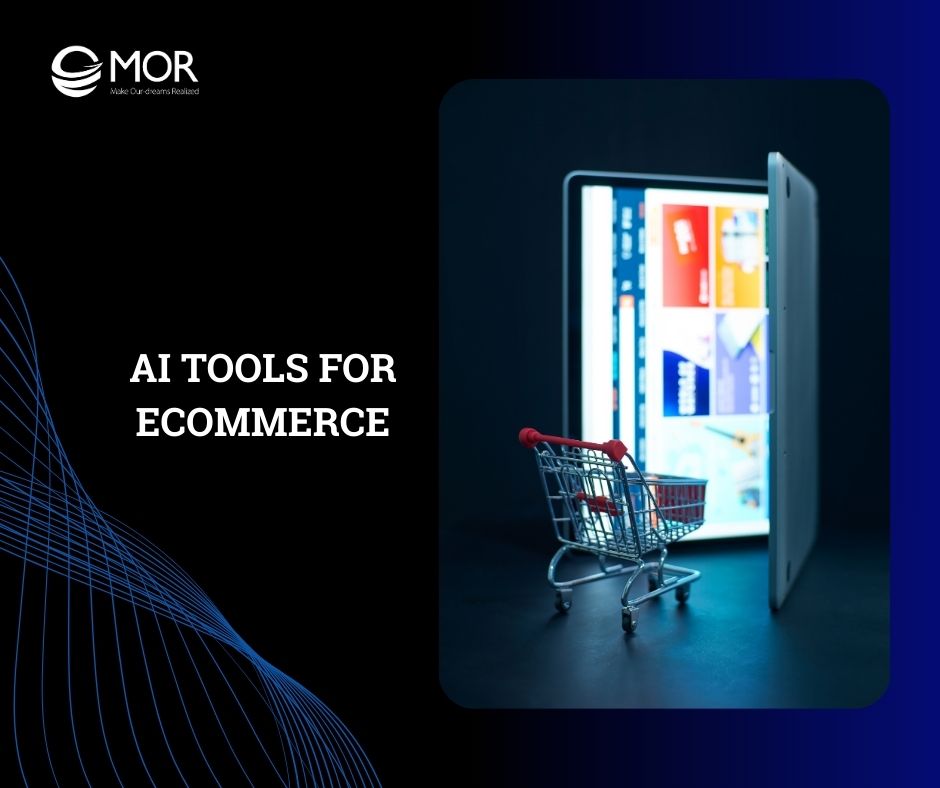
Online stores are growing faster than ever, but so are the demands. Customers want quick support, spot-on recommendations, and smooth checkouts. That’s why AI tools for eCommerce are now a must-have, not just a ‘nice-to-have.’ This MOR Software’s guide shows how top brands use AI tools for eCommerce business to stay ahead, work smarter, and sell more.
Why AI Tools Are Essential for eCommerce Growth
Retail isn't what it used to be. Customers don’t wait. They scroll, compare, and bounce in seconds. Store owners are juggling more touchpoints than ever like web, mobile, social, email, chat. That’s where AI steps in.
Global retail machine learning spending is projected to hit $24.1 billion by 2028, according to KBV research. The reason is simple: AI solves real business problems. From handling support tickets without staff to recommending the right products based on browsing habits, the use of AI in eCommerce turns manual work into smart automation.
Retailers using custom AI solutions for eCommerce are seeing major gains. Personalized recommendations alone can increase conversion rates by up to 30%, according to McKinsey. That’s not a small lift. It’s the kind of shift that defines winners.
If you’re selling online, using eCommerce AI tools isn’t about being trendy. It’s about staying in the game. Better yet, staying ahead of it.
The next section breaks down exactly how these tools translate into tangible business benefits.
Key Benefits of Using AI Tools for eCommerce
AI isn’t just about automation. It’s about smarter decisions, faster workflows, and stronger customer connections. When applied right, AI tools for eCommerce can change how your store performs day in, day out.
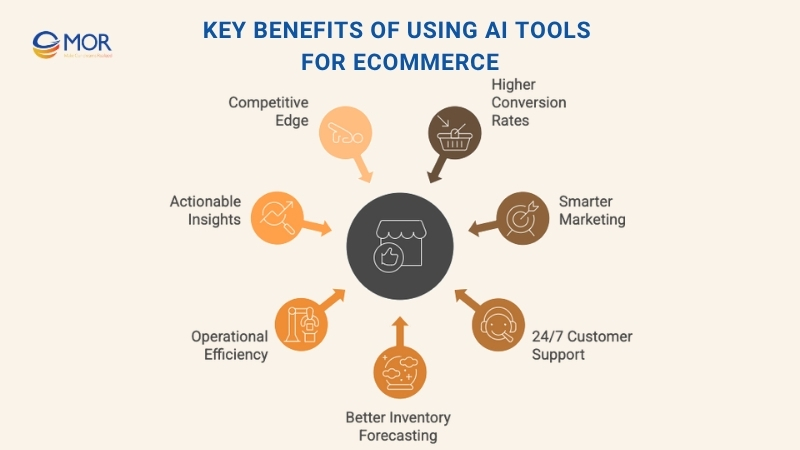
Higher conversion rates
Personalization isn’t a bonus anymore. It’s expected. AI tools for eCommerce analyze browsing behavior, purchase history, and real-time signals to recommend the right product at the right time.
Brands using AI-driven suggestions have reported 20% to 30% higher revenue. When customers feel understood, they’re more likely to check out.
Smarter marketing performance
Broad, generic campaigns cost more and return less. AI segments audiences by behavior, location, and past actions. It helps tailor messaging, schedule emails, and deliver offers that actually land.
Klarna cut external agency spend 25% after rolling out generative AI automation for creative production. AI-driven email personalization can lift open rates by up to 41%.
24/7 customer support
Buyers expect fast answers, no matter the hour. AI chatbots respond instantly, handle basic issues, and route complex ones to the right agent. AI chatbots reduce support costs by up to 40%. They can resolve as much as 79% of routine inquiries unaided. In busy stores, this isn't optional. It's basic survival.
Better inventory and demand forecasting
Carrying too much stock drains your cash. Running out costs you sales. AI predicts demand based on season, location, campaigns, and trends. This helps cut waste and improve delivery rates. Stores using AI solutions for eCommerce cut forecast errors 20 – 50% and improve accuracy 35 – 42%.
Operational efficiency
Tasks like tagging items, flagging fraud, or changing prices can eat up hours. AI takes care of these jobs in seconds. Visa reports AI fraud-detection systems reduce chargebacks 87% and false positives 80%.
Actionable business insights
AI doesn’t just gather data. It makes it useful. You can spot which ads actually convert or which segments bring the highest return. These insights help guide smarter pricing, content, and product planning, no analyst team required.
Competitive edge
The early movers have already pulled ahead. Brands using AI tools for eCommerce business operate faster, personalize smarter, and scale quicker than those stuck in manual mode. AI is no longer a trend. It’s the engine behind the stores leading the pack.
>>> READ MORE: TOP 6 Information Sets Used in Machine Learning You Should Know
Top 10 AI Tools for eCommerce: A Feature & Pricing Comparison
Finding the right AI tools for eCommerce can feel like a maze. To make the choice easier, we’ve rounded up ten of the most trusted platforms. Each entry below breaks down real use cases, standout features, key integrations, pricing highlights, and user sentiment so you know what works for your store, not just in theory.
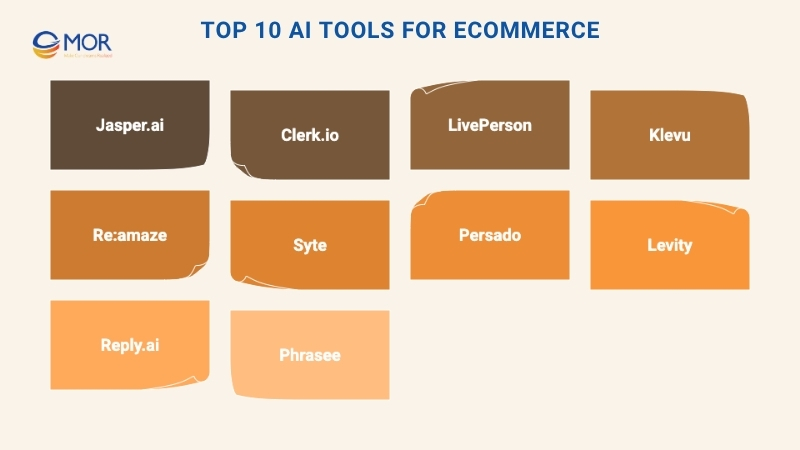
1. Jasper.ai
Overview & Main Use Case: Jasper.ai leads in content generation for eCommerce. It writes product descriptions, ad copy, and SEO blog posts at scale, using machine learning algorithm that adapts to your brand’s style.
Standout Features:
- AI-generated product descriptions and ads
- Bulk content creation for catalogs and campaigns
- Multilingual support for global brands
- Style, tone, and format customization
Integrations: Shopify, WooCommerce, Magento, BigCommerce, WordPress, Google Docs
Pricing: Starts at $49/month for Creator. Team and Business plans available.
Ratings: G2: 4.7/5, Capterra: 4.8/5
Users praise its “time-saving for large stores” and “SEO improvements that move the needle.”
2. Clerk.io
Overview & Main Use Case: Clerk.io is all about smart personalization. Its main job: deliver tailored product recommendations, search, and emails that help shoppers find the right items, fast.
Standout Features:
- Real-time product recommendations
- Intelligent search and filtering
- Personalized email content
- Automatic upsell and cross-sell tools
Integrations: Shopify, Magento, WooCommerce, BigCommerce, Salesforce Commerce Cloud, PrestaShop
Pricing: Custom, based on store size and needs.
Ratings: Capterra: 4.6/5, G2: 4.7/5. “Easy to implement, and our conversions jumped,” one user shares.
3. LivePerson
Overview & Main Use Case
LivePerson is a leader in conversational AI for support and sales. It gives stores AI-powered chatbots and messaging that handle common questions, capture leads, and speed up service.
Standout Features:
- AI chatbot development services for live support
- Omnichannel messaging (web, SMS, WhatsApp)
- Lead capture and routing
- Analytics for customer journeys
Integrations:
Shopify, Magento, BigCommerce, custom APIs, Zendesk, Salesforce
Pricing:
Contact for quote (tailored plans).
See full pricing → LivePerson
Ratings:
G2: 4.2/5, Trustpilot: 4.1/5. “Reliable support, major time-saver for our CS team.”
4. Klevu
Overview & Main Use Case: Klevu delivers advanced AI-powered search and category navigation. It helps shoppers find products with natural language, filters, and personalized results.
Standout Features:
- Smart search with typo tolerance
- Personalized product listings
- Automated product tagging
- Voice and image search
Integrations: Shopify, Magento, BigCommerce, Salesforce Commerce Cloud, WooCommerce
Pricing: Starts at $499/month for Growth.
Ratings: G2: 4.6/5, Capterra: 4.8/5. “Search accuracy and conversions noticeably improved,” say users.
5. Re:amaze
Overview & Main Use Case: Re:amaze brings unified support with AI chatbots, ticketing, and automation. Perfect for stores that want multi-channel service in one dashboard.
Standout Features:
- AI-driven chatbot and live chat
- Shared inbox for all channels
- Automated workflows for FAQs
- Order and shipment tracking in chat
Integrations: Shopify, BigCommerce, WooCommerce, Magento, Slack, Facebook Messenger
Pricing: Starts at $29/month per team member.
Ratings: Capterra: 4.7/5, G2: 4.6/5. “Handles high support volume without headaches.”
6. Syte
Overview & Main Use Case: Syte is the go-to for visual search and discovery. Customers snap a photo or upload an image, and Syte’s AI finds similar products instantly.
Standout Features:
- Visual product search
- Shop-the-look and style recommendations
- Automated tagging
- Deep learning for visual discovery
Integrations: Shopify, Magento, BigCommerce, Salesforce, WooCommerce
Pricing: Custom, based on traffic and catalog.
Ratings: G2: 4.5/5, Trustpilot: 4.3/5. “Turned our site into a ‘shop by photo’ experience.”
7. Persado
Overview & Main Use Case: Persado specializes in AI-powered marketing language. It crafts high-converting subject lines, SMS, ads, and push messages based on emotional triggers and data.
Standout Features:
- Predictive copy for every channel
- Emotional and audience targeting
- Multivariate copy testing
- Insights on top-performing words
Integrations: Salesforce, Adobe, Oracle, custom APIs, major eCommerce platforms
Pricing: Enterprise pricing, custom quotes.
Ratings: G2: 4.4/5, Capterra: 4.7/5. “We doubled our open rates with Persado’s email copy.”
8. Levity
Overview & Main Use Case: Levity helps eCommerce teams automate workflows that need a ‘human touch.’ It can sort tickets, tag reviews, and flag product images without any coding.
Standout Features:
- No-code automation for custom tasks
- Multimodal AI models trained on your data
- Visual workflow builder
- Smart ticket tagging and escalation
Integrations: Shopify, Zendesk, Gmail, Slack, custom APIs
Pricing: Starts at $49/month, scaling with usage.
Ratings: G2: 4.6/5, Capterra: 4.5/5. “Saves us hours on manual review each week.”
9. Reply.ai
Overview & Main Use Case: Reply.ai focuses on conversational AI for sales and customer service. It automates chat flows, helps resolve issues, and guides shoppers through the funnel.
Standout Features:
- Automated chat for support and sales
- AI-powered FAQ and ticket handling
- Lead qualification in chat
- Integration with SMS and messaging apps
Integrations: Shopify, Zendesk, Salesforce, Facebook Messenger, WhatsApp
Pricing:
Custom pricing, contact for details.
See full pricing → Reply.ai
Ratings: G2: 4.5/5, Capterra: 4.6/5. “Response times dropped by half, sales leads up.”
10. Phrasee
Overview & Main Use Case: Phrasee is built for AI-driven copywriting in email and SMS. It helps eCommerce brands send subject lines and marketing messages that get clicks at scale.
Standout Features:
- Real-time language generation
- A/B testing for copy
- On-brand, AI-generated SMS/email text
- Performance tracking dashboard
Integrations: Salesforce, Adobe Campaign, Oracle, custom APIs
Pricing: Enterprise/Custom.
Ratings: G2: 4.4/5, Capterra: 4.6/5. “Subject line click rates improved, great reporting.”
AI Tools for eCommerce Comparison Table
Tool | Main Use Case | Standout Features | Integrations | Starting Price | User Rating |
Jasper.ai | Content Generation | Bulk copy, style match | Shopify, Magento, BigCommerce, WP | $49/mo | 4.7/5 (G2) |
Clerk.io | Personalization | Real-time recs, search | Shopify, Magento, WooCommerce | Custom | 4.6/5 (Cap) |
LivePerson | Conversational AI | Chatbots, omnichannel | Shopify, Magento, Zendesk, Salesforce | Quote | 4.2/5 (G2) |
Klevu | AI Search | Smart search, tagging | Shopify, Magento, WooCommerce | $499/mo | 4.8/5 (Cap) |
Re:amaze | Support Automation | Chatbot, inbox, tracking | Shopify, BigCommerce, Slack | $29/mo/user | 4.7/5 (Cap) |
Syte | Visual Search | Visual recs, tagging | Shopify, Magento, Salesforce | Custom | 4.5/5 (G2) |
Persado | AI Copywriting | Emotional targeting | Salesforce, Adobe, Oracle | Enterprise | 4.4/5 (G2) |
Levity | Workflow Automation | No-code builder, tagging | Shopify, Zendesk, Slack | $49/mo | 4.6/5 (G2) |
Reply.ai | Conversational Sales | Chatbot, FAQ, SMS | Shopify, Zendesk, WhatsApp | Custom | 4.5/5 (G2) |
Phrasee | Marketing Copy | AI language, A/B testing | Salesforce, Oracle, Adobe | Enterprise | 4.4/5 (G2) |
How to Choose the Right AI Tools for Your eCommerce Store?
Finding the right tool starts with knowing your business inside and out. Not every solution will be a fit. Before signing a contract or starting a trial, weigh these factors first:
Business size: Smaller stores may benefit from simpler, plug-and-play tools like Jasper.ai or Re:amaze. Larger operations should look at platforms with deeper automation, analytics, and onboarding support.
Sales volume: High-traffic sites need tools that scale under pressure. Choose AI automation tools for eCommerce that are proven to handle spikes during peak seasons or flash sales without lag.
Tech stack: Check if your current systems can support AI integration. Do you use Shopify or Magento? Does your CRM talk to your storefront? Your stack must allow clean connections across systems to avoid data silos.
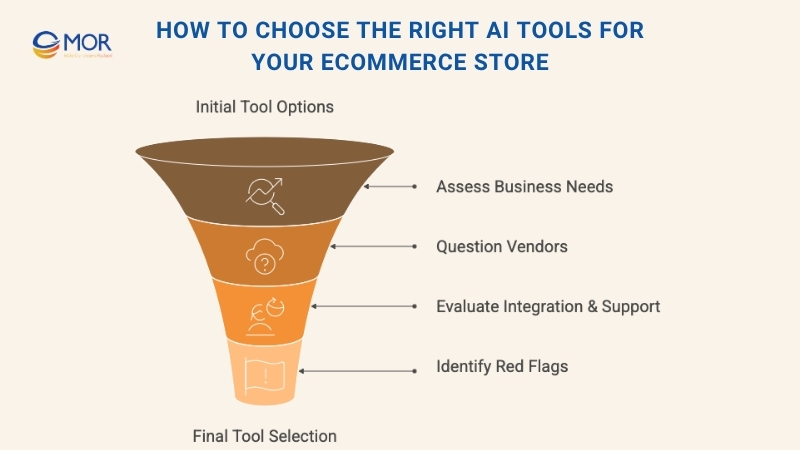
Questions to ask every vendor:
- Does your tool support my current platform and CRM?
- How much training does it require?
- Is there a limit on users, data, or traffic?
- What happens if I want to scale up or switch plans?
Integration and support: Pick a tool that doesn’t create more work. Look for built-in integrations with your eCommerce platform, analytics tools, and email providers. Ask about customer support: is it email-only, or do they offer onboarding calls and live chat?
Watch for these red flags:
- Vague pricing with surprise add-ons
- Long-term contracts without trial options
- No clear documentation or product demos
- Weak integrations that require manual patching
- Tools that don’t evolve with updates or AI training
Choosing the right AI tool isn’t just about features. It’s about finding one that fits your goals, scales with your business, and won’t slow down your operations.
Real Results: Success Stories Using AI Tools in eCommerce
Brands that use AI tools for eCommerce are seeing real returns. Whether it’s better support, smarter product discovery, or stronger conversion rates, AI is quietly working behind the scenes to move the needle.
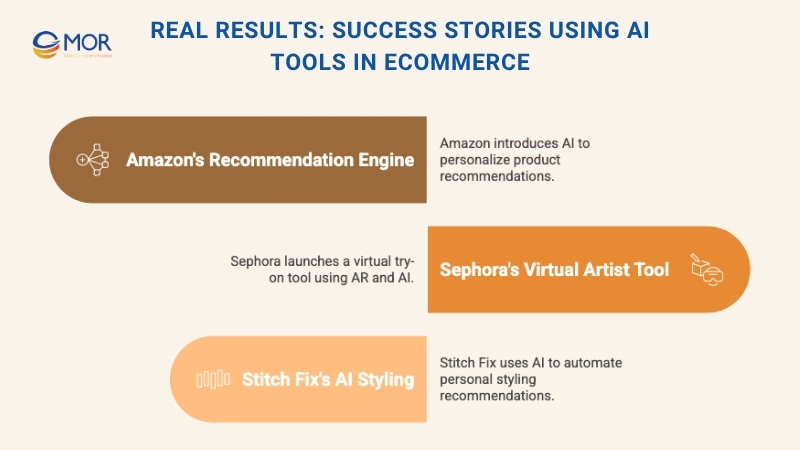
Amazon
- Problem: Generic product recommendations failed to engage shoppers.
- Solution: AI-powered recommendation engine that analyzes browsing patterns, purchase history, and real-time behavior.
- Outcome: Around 35% of Amazon’s revenue now comes from personalized recommendations.
Sephora
- Problem: Online beauty shoppers struggled to visualize how products fit their needs.
- Solution: AI-based “Virtual Artist” AR tool and personalized product suggestions via customer data analysis.
- Outcome: Increased customer engagement and conversions thanks to virtual try-on and targeted recommendations .
Stitch Fix
- Problem: Customers craved personable styling but inventory was hard to personalize at scale.
- Solution: AI algorithms used customer profiles, sizing data, and feedback to tailor fashion selections.
- Outcome: Higher personalization led to improved customer loyalty and more efficient stock management.
Transform Your eCommerce Success with MOR Software’s AI Solutions
If you’re planning to adopt AI tools for eCommerce but don’t want the tech burden slowing you down, MOR Software JSC is ready to help. We build scalable, flexible AI consulting solutions that fit real business goals, not just demo use cases.
- Full-spectrum AI development: From raw data to live models, MOR covers everything: data processing, training, testing, and deployment. You get complete visibility, from start to finish.
- Custom AI for web and mobile stores: We don’t just integrate off-the-shelf solutions. We build custom product recommendation engines, dynamic pricing tools, and AI-driven inventory systems right into your online store.
- Easy integration with Salesforce and legacy systems: Got an older CRM or ERP system? No problem. We’ve handled complex Salesforce integrations, stitched together disconnected data pipelines, and created unified customer views across devices.
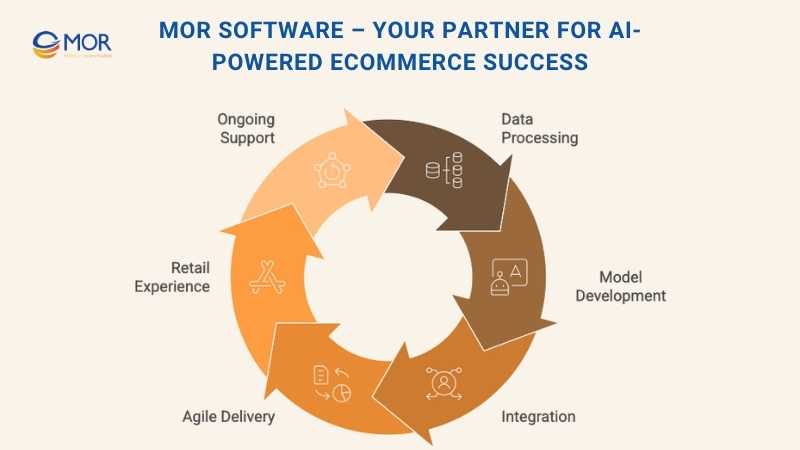
- Agile, fast, and budget-friendly delivery: We use a dedicated offshore team model. That means shorter development cycles, clear sprints, and predictable pricing without compromising quality.
- Proven experience in retail and eCommerce: With billions of VND in delivered projects, we’ve helped eCommerce brands move faster, reduce manual work, and grow smarter. Our experience covers everything from fashion to consumer electronics.
- Reliable DevOps and support: Post-launch, we stay close. Our DevOps team runs security patches, performance checks, and real-time monitoring to keep your AI stack stable and sharp.
Looking to make AI a real part of your eCommerce strategy? Contact us today. We’ll help you get there, without the guesswork.
Conclusion
Choosing the right AI tools for eCommerce doesn’t have to feel overwhelming. When matched with your goals and integrated properly, these tools deliver real results: higher revenue, better customer experiences, and smarter operations. Whether you're just starting or scaling fast, AI can power the next phase of your eCommerce growth. Ready to get started? Contact MOR Software.
MOR SOFTWARE
Frequently Asked Questions (FAQs)
Can AI tools help small or startup eCommerce businesses?
Yes. Tools like Jasper.ai or Re:amaze offer plug-and-play functionality that works well for lean teams.
What is the typical ROI of implementing AI in eCommerce?
It depends on the use case. Most brands see measurable gains in conversion rates, reduced cart abandonment, and lower support costs within months.
How long does it take to deploy an AI solution?
Off-the-shelf tools can be live in days. Custom integrations or AI model training may take 4–12 weeks, depending on complexity.
Are AI tools difficult to integrate with my current store?
Most top-tier solutions support Shopify, Magento, WooCommerce, and BigCommerce. Look for APIs and native plugins to simplify integration.
Do I need technical expertise to manage these tools?
Not always. Many platforms are built for marketers, not developers. But for advanced use cases, partnering with a tech team like MOR makes things smoother.
Rate this article
0
over 5.0 based on 0 reviews
Your rating on this news:
Name
*Email
*Write your comment
*Send your comment
1